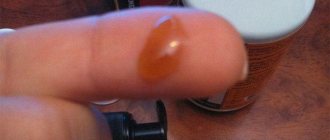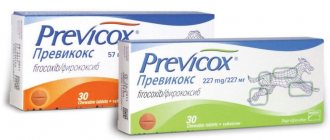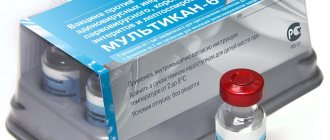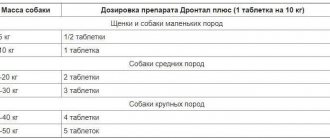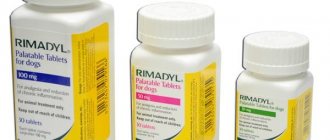Rimadyl is a popular and effective pain reliever for dogs. But many owners are afraid to give it to their pets. There are a lot of negative reviews about the drug: pet owners and veterinarians talk about a lot of side effects from the digestive system and even deaths.
In the article, I looked at how Rimadyl works, is it really that dangerous, ways to prevent negative reactions, and features of taking the medication. At the end of the article you will find a list of safer analogues and recommendations for using the drug.
I also recommend checking out our great review of 25 pain relievers for dogs.
Release form and composition
Rimadyl is a non-steroidal anti-inflammatory drug (NSAID). This is the most effective group of drugs for relieving pain and inflammation, not counting opiates.
Rimadyl is produced by two American companies: “Zoetis Inc.” and Pfizer Animal Health. Both companies produce the drug in two forms: tablets and injections for injections.
The tablets are produced under the name Rimadyl P in 3 dosages: 20 mg, 50 mg and 100 mg. The concentration of components differs for each type.
| Active ingredients | Dosage | ||
| 20 mg | 50 mg | 100 mg | |
| Carprofen | 20 mg | 50 mg | 100 mg |
| Dried Pork Liver Powder | 120.62 mg | 301.55 mg | 603.1 mg |
| Hydrolyzed vegetable protein | 1.748 mg | 4.369 mg | 8.739 mg |
| Corn starch | 3.635 mg | 9.088 mg | 18.176 mg |
| Confectionery sugar | 8.389 mg | 20.97 mg | 41.9 mg |
| Glucose syrup | 103.515 mg | 258.788 mg | - 517.576 mg |
| Gelatin type A | 5.593 mg | 13.981 mg | 27.963 mg |
| Magnesium stearate | 0.573 mg | 1.433 mg | 2.867 mg |
| Lactose monohydrate | 8.277 mg | 20.692 mg | 41.38 mg |
The active component of the drug is carprofen. The remaining components are auxiliary, intended for forming, storing and flavoring tablets.
In a 5% solution of Rimadyl injection, the main active ingredient is also carprofen. The remaining components are different.
| Active substance | Content per 1 ml of solution |
| Carprofen | 50 mg |
| L-arginine | 30 mg |
| Glycocholic acid | 88.5 mg |
| Benzyl alcohol | 10 mg |
| Water for injections | up to 1 ml |
The average price of tablets (pack of 20 pieces) in a dosage of 20 mg is 600 rubles, 50 mg is 620 rubles, 100 mg is 810 rubles. A 20 ml bottle of solution sells for 2,300 rubles.
Alternatives to Rimadyl for Dogs
Rimadyl is one of the safest NSAIDs available for dogs, but there are alternatives if your dog has an adverse reaction. Talk to your veterinarian about prescribing an alternative pain reliever or alternative pain management strategies for your dog's osteoarthritis.
Your veterinarian is your best source of information about Rimadyl for dogs. Don't be afraid to ask any questions you may have, and make sure you give your dog the prescribed dose and follow your veterinarian's instructions.
Buy Rimadyl for dogs
Indications for use
The drug is intended to relieve pain and inflammation of any etiology. Rimadyl P tablets are most often used for 3 conditions:
- diseases of the musculoskeletal system;
- joint pathologies: bursitis, arthritis, arthrosis, etc.;
- limb injuries: fractures, sprains, bruises, bone cracks, etc.
Capsules are also used in the postoperative period. But the solution works better here.
The drug has proven itself well in dogs with sore joints. It is used in addition to the main treatment as a means to relieve pain and inflammation. The drug alleviates acute symptoms and allows animals to move freely.
How safe is it?
Rimadyl is generally safer for dogs than other NSAIDs, but it is possible that an animal will react to the drug and cause a life-threatening condition.
The drug may have a negative effect on animals with the following clinical indications:
- liver or kidney failure,
- advanced age of the animal (higher risk of negative reactions),
- bleeding (for example, von Willebrand disease - a hereditary disease associated with blood clotting disorders),
- intestinal inflammation,
- animal age - up to 6 weeks,
- during pregnancy or breastfeeding.
How it works
There is only one active ingredient in tablets and solution – carprofen. Therefore, the main effect of both drugs is the same: the synthesis of inflammatory prostaglandins is blocked. As a result:
- pain is relieved;
- inflammation is eliminated;
- fever decreases slightly.
L-Arginine contained in the solution further strengthens the immune system, accelerates wound healing, promotes muscle gain and fat loss. It also stimulates collagen production, improves blood circulation, including normalizing blood flow to the joints.
Pharmacological properties
Rimadyl R , belonging to the group of non-steroidal anti-inflammatory drugs, has anti-inflammatory, analgesic and antipyretic effects. Carprofen, the active ingredient of Rimadyl R, in the arachidonic acid cycle primarily inhibits cycloxygenase-II, which is produced in the body in response to the development of inflammation. As a result, the synthesis of inflammatory prostaglandins, which cause inflammation, swelling and pain, is blocked. In therapeutic doses, carprofen has a much weaker effect on cycloxygenase-I, and therefore does not affect the synthesis of protective prostaglandins. Carprofen does not interfere with normal physiological processes in tissues, especially in the stomach, intestines, kidneys and platelets, is quickly absorbed from the gastrointestinal tract, reaches peak concentrations in the blood plasma 1 to 3 hours after administration, with a bioavailability of more than 90%. The half-life in dogs is approximately 8 hours. Carprofen is more than 99% bound to plasma proteins. The drug is metabolized in the liver, excreted in feces (about 80%), as well as in urine.
Instructions for use and dosage
The features of using Rimadyl tablets and solution are different.
The capsules are given to the animal on its own. The daily dose is 4 mg per 1 kg of weight, it is advisable to divide it into 2 doses. So, if you have a dog weighing 10 kg, then feed him a 20 mg tablet in the morning and evening.
After a week of taking the tablets, the daily dose can be reduced by 2 times according to the recommendation of the veterinarian. The course of treatment is determined by the doctor, but it is not advisable to give Rimadyl P for more than 2 weeks due to side effects.
The injection is given once subcutaneously or intravenously at a dosage of 4 mg per 1 kg (1 ml per 12.5 kg of animal weight). If necessary, repeat the injection a day later at half the dose (2 mg/kg or 0.5 ml per 12.5 kg). If treatment needs to be continued, switch to capsules.
After piercing the cap, the solution is used for a month. After 4 weeks, the bottle is thrown away, even if the medicine remains.
The solution is mainly used by veterinarians in the clinic. It is not advisable to use it for home treatment.
Pros and cons of Rimadyl for dogs
The side effects associated with Rimadyl are serious, but it also has a negative impact on the quality of life of canine osteoarthritis. As an owner, you must weigh the pain associated with osteoarthritis against the relatively low risk of Rimadyl side effects.
Talk to your veterinarian about your concerns and let him know about any other medications your dog is taking, as well as any other conditions your veterinarian may not know about.
Buy Rimadyl for dogs
Contraindications and side effects
Rimadyl is a moderately dangerous drug (hazard class 3 according to GOST 12.1.007). But the drug can cause serious side effects, mainly from the gastrointestinal tract. Among them:
- vomit;
- diarrhea;
- damage to the walls of the stomach and intestines;
- lack of appetite;
- apathy, depression;
- changes in renal biochemical parameters.
Negative reactions can also occur in healthy dogs. The medication is especially dangerous and not recommended for pregnant and lactating bitches, as well as animals with:
- kidney and liver dysfunction;
- diseases of the digestive system;
- heart pathologies;
- hypersensitivity to drug components.
If your pet experiences side effects, stop taking Rimadyl and immediately contact a veterinarian. The doctor will prescribe symptomatic treatment.
Rimadyl is not used with other NSAIDs and nephrotoxic medications: the minimum break between doses is one day.
Side effects
Despite the full confidence of the manufacturer in the safety of Rimadyl for dogs, in practice, breeders and dog breeders are often convinced of the opposite. On the other hand, as experience shows, serious side effects after consuming Rimadyl are often associated with insufficient competence of the doctor or with the negligence of the dog owner.
If the drug is used inattentively and carelessly, the following reactions are possible:
- lack/increase of appetite or craving for inedible things;
- nausea or vomiting;
- constipation/diarrhea (especially with bloody discharge);
- yellowing of the mucous membranes, whites of the eyes and skin;
- frequent and copious urination;
- increased thirst;
- redness of the epidermis, including the appearance of ulcers or scabs (especially after Rimadyl injections);
- strange behavior (aggression, poor coordination, increase/decrease in activity).
Important! The most severe side effects are gastrointestinal bleeding, as well as deep (poorly healing) ulcerative lesions.
If the veterinarian does not notice diseased kidneys/liver, these organs (after prescribing Rimadyl) may fail. Even minor side effects should be a signal to discontinue the drug. In this case, the doctor, as a rule, prescribes symptomatic and antihistamines.
Return to content
Analogues of the drug
| Analogue | What is the difference | average price |
| Previcox | Contains the safer active ingredient firocoxib. Acts faster – relieves pain in 15 minutes. Side effects are milder and occur less frequently. | A package of 10 tablets costs 750-1,450 rubles. depending on dosage. |
| Remkal | An analogue of Rimadyl with the same active ingredient – carprofen. Negative reactions are less pronounced. | 200 rub. for 10 tablets of 20 mg. |
| Trokoksil | The active ingredient is mavacoxib. Relieves pain faster, better suited for diseases of the musculoskeletal system. It is prohibited for puppies under one year old; it can be used with caution in puppy dogs. | A package of 2 capsules costs 700-1,600 rubles. depending on dosage. |
| Norocarp | Russian analogue of Rimadil. Contains carprofen, has the same restrictions and side effects. | A blister of 10 tablets sells for 300-700 rubles. depending on the dose. |
Limitations and possible consequences
Rimadyl is considered a safe drug for dogs, but has restrictions on its use. The medicine is not prescribed:
- for chronic diseases of the heart, liver, kidneys;
- in case of circulatory disorders;
- in case of dysfunction of the digestive system, including gastritis;
- during pregnancy, lactation;
- at an early age (up to one year);
- in case of individual intolerance to the components.
The veterinarian should be informed about the presence of these pathologies or the use of any medications during examination. Rimadyl is not prescribed if animals are predisposed to allergic reactions or if they are planning mating in the near future.
Important! The medicine should not be given with other anti-inflammatory or nephrotoxic drugs.
If the dosage is violated, self-medication and there are prohibitions on taking carprofen, negative reactions are possible:
- lack of appetite, complete refusal to eat;
- nausea, vomiting;
- increased thirst;
- diarrhea with bloody discharge;
- yellowing of the skin, sclera of the eyes;
- frequent urination;
- skin reactions - redness, ulceration;
- change in behavior: aggression, tremors, lack of coordination of movements.
Owner reviews
Inna: “Six months ago the dog started limping after exercise. We tried to treat ourselves with vitamins, calcium and chondroprotectors - it didn’t help. The condition worsened and I had to go to the clinic. X-rays revealed no problems with the joints, but the dog also limped. The doctor prescribed Rimadyl, after asking how often we had gastrointestinal disorders. I gave the pet pills, and after a month he came back to life: he runs and plays freely, although I try very hard not to burden him.”
Ksenia: “After a course of pills, the dog developed bursitis on all joints, although there was only one before taking it. A friend of mine, the owner of a shepherd dog, has an even worse situation: she had to be given IV drips, her condition after the drug was terrible. So Rimadyl is off my list of medications forever.”
Julia: “My dog has chondrosis. The doctor, in addition to the Target T + Traumeel blockades, prescribed Rimadyl to relieve pain. But he forbade giving it for more than 3 days in a row, apparently due to a damaged liver and heart disease. The drug did not cause any harm, it is good, but it should be used with great caution.”
General information on pain medications
There are several types of drugs that have analgesic properties. Each of them differs in its composition, spectrum of action, number of side effects, etc.
- Nutraceuticals are drugs that contain natural ingredients: herbs, antioxidants, amino acids, minerals, and therefore have almost no contraindications. They are often used to relieve joint pain.
- NSAIDs or non-steroidal anti-inflammatory and pain relievers are considered one of the most effective drugs. But they should be used with caution - they have a lot of side effects, including internal bleeding.
- Steroid medications are used as analgesics and relieve inflammation. However, like NSAIDs, they cannot be used without a doctor’s prescription. They can cause serious health problems for your pet.
- The most powerful are narcotic painkillers and opioids. They are prescribed only in extreme cases (severe forms of joint diseases, malignant tumors, etc.).
Remember that your dog should not be given human medications! You are unlikely to be able to correctly calculate the dosage, and there is also a high risk of getting a lot of side effects. So what painkiller can you give your dog at home? Below is a list and description of recommendations for the use of medications suitable for your pet.
Answers to frequently asked questions
Is Rimadyl sold without a prescription?
No, the drug is dispensed only as prescribed by a veterinarian and used under his supervision. The drugs have strong side effects, so a specialist must calculate the dosage, determine the duration of the course and monitor the animal’s condition.
Is it permissible to give medication continuously?
In special cases, it is possible to use tablets in courses (every few months) or for life in older dogs. But such use is undesirable due to negative reactions from the gastrointestinal tract.
Can I give Rimadyl injections myself?
Possibly if you know how to inject. But usually there is no need: injections are given 1, maximum 2 times in special cases: after fractures, operations, etc. In addition, when used independently, there is a risk of incorrectly calculating the dosage.
How quickly do the pills work?
The first effects are noticeable after an hour. Maximum pain relief is achieved within 3 hours.
special instructions
Do not exceed the prescribed dose or duration of treatment. When using carprofen and warfarin simultaneously, the clinical situation must be carefully monitored, since both of these drugs bind to plasma proteins. During the procedure with Rimadyl R, you should follow the general rules of personal hygiene and safety precautions provided for when working with medicines. As with any medicine, wash your hands thoroughly with warm water and soap after handling. It is prohibited to consume food or water while working.
Storage conditions
With caution (list B) in a dry, dark place, out of reach of children, at a temperature of 0 to 25 ° C. Shelf life – 3 years.
Safety precautions
Rimadyl contains highly active components. When interacting with it, it is advisable to take personal precautions:
- wear disposable gloves;
- do not drink or eat during the procedure;
- Wash your hands when finished.
If the injection solution accidentally gets on the mucous membranes, rinse them with plenty of water.
Andrey, Moscow
“I have been working as a veterinarian for more than fifteen years. I prescribe Rimadyl to relieve inflammation, swelling after surgery and for joint diseases. The drug is strong, so if treated incorrectly there can be serious complications or an overdose. I have heard about fatal cases, but in my experience this has never happened. I always tell animal owners in detail what to do in case of unwanted reactions. Remember that these are not vitamins, you need to be careful!”
Zhanna, Nizhny Novgorod
“My dog had a severe attack of polyarthritis. In addition to other medications, the veterinarian prescribed this drug. He warned about possible complications and said that Rimadyl should only be given after meals. Honestly, after the negative reviews, it was scary to treat the dog with this medicine. But I did everything according to the instructions, and the pet went through everything without any problems.”
Pregnant, lactating and puppies
Most veterinarians do not recommend giving this drug to female dogs at any stage of pregnancy as it may adversely affect the fetus. It is also contraindicated for nursing mothers.
The question of whether this medicine can be given to puppies should be decided by a specialist. If its use is justified, the doctor must calculate the exact dosage depending on the degree of development and condition of the animal. He will also tell you how best to treat the puppies - give injections or feed tablets.
Precautionary measures
It is not recommended to use different non-steroidal anti-inflammatory drugs (Rimadyl, analogues) at the same time. Also, nephrotoxic drugs should not be used earlier than 24 hours after consuming Rimadyl. Taking them together can lead to serious consequences for vital organs. It is very important to evaluate the condition of the heart and kidneys, as well as the liver, before the appointment. To do this, it is recommended to undergo a full examination and pass all the necessary tests. This is the only way you can protect your little friend from possible side effects. It is prohibited to use the drug on dogs bearing puppies, as this may adversely affect the health of the babies.
Different breeds
Depending on what breed the pet is: large, medium or small, you need to calculate the exact dosage of the drug.
Insufficient intake of the active substance into the body will be ineffective in treating the disease, while an overdose can be fatal, especially for small breeds. Therefore, it is better to discuss this issue with a specialist.
general description
For convenient and effective use, the manufacturer produces the drug in two versions - tablets and injection solution. Injections are more suitable for relieving severe pain and emergency treatment for injuries, and tablets are usually used to treat chronic pathologies.
Rikarf injection solution is a clear, pale yellow liquid, the main component of which is carprofen. The medicinal liquid is packaged in bottles made of dark glass. The capacity of each bottle is 20 ml.
Note! The solution should be stored in the refrigerator (at a temperature of 2 to 8˚C). After opening the bottle, the drug can only be used for 4 weeks, and then must be disposed of
The dark brown Rikarf tablet has a heterogeneous structure and contains dark inclusions. On one side there is a line, which makes it possible to divide the tablet into equal parts. The content of carprofen in one tablet can be 20, 50 and 100 mg, although the drug with the highest concentration is rarely found in pharmacies due to low demand.
In addition to a number of auxiliary components, the composition includes a flavoring agent that gives the tablets a meat aroma.

